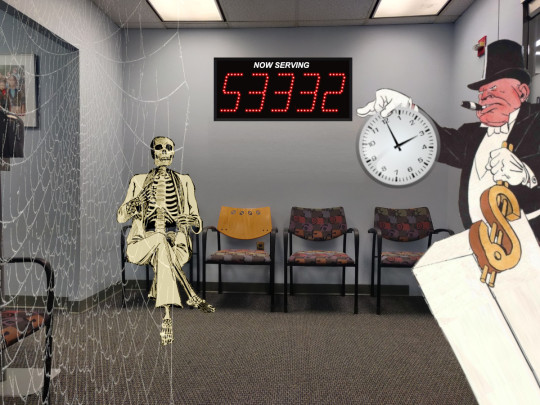#auts
Text

4K notes
·
View notes
Text


fonte: @l-a-s-c-i-v-i-a
3K notes
·
View notes
Text
Poor people pay higher time tax

Doubtless you’ve heard that “we all get the same 24 hours in the day.” Of course it’s not true: rich people and poor people experience very different demands on their time. The richer you are, the more your time is your own — not only are many systems arranged with your convenience in mind, but you also command the social power to do something about systems that abuse your time.
If you’d like an essay-formatted version of this post to read or share, here’s a link to it on pluralistic.net, my surveillance-free, ad-free, tracker-free blog:
https://pluralistic.net/2023/02/10/my-time/#like-water-down-the-drain
For example: if you live in most American cities, public transit is slow, infrequent and overcrowded. Without a car, you lose hours every day to a commute spent standing on a lurching bus. And while a private car can substantially shorted that commute, people who can afford taxis or Ubers get even more time every day.
There’s a thick anthropological literature on the ways that cash-poverty translates into #TimePoverty. In David Graeber’s must-read essay “The Utopia of Rules,” he nails the way that capitalist societies generate Soviet-style bureaucracies, especially for poor people. Means-testing for benefits means that poor people spend endless hours filling in forms, waiting on hold, and lining up to see caseworkers to prove that they are among the “deserving poor” — not “mooches” who are defrauding the system:
https://memex.craphound.com/2015/02/02/david-graebers-the-utopia-of-rules-on-technology-stupidity-and-the-secret-joys-of-bureaucracy/
The social privilege gradient is also a time gradient: if you can afford a plane ticket, you can travel quickly across the country rather than losing days to the Greyhound or a road-trip. But if you’re even richer, you can pay for TSA Precheck and cut your airport security time from an hour to minutes. Go further up the privilege gradient and you’ll acquire airline status, shaving another hour off the check-in process.
This qualitative account of time poverty is well-developed, but it’s lacked a good, detailed quantitative counterpart, and our society often discounts qualitative work as mere anecdote and insists on having every story converted to numbers before it is taken seriously.
In “Examining inequality in the time cost of waiting,” published this month in Nature Human Behavior, public affairs researchers Steve Holt (SUNY) and Katie Vinopal (Ohio State) analyze data from the American Time Use Survey (AUTS) to produce a detailed, vibrant quantitative backstop to the qualitative narrative about time poverty:
https://www.nature.com/articles/s41562-023-01524-w
(The paper is paywalled, but the authors made a mostly final preprint available)
https://osf.io/preprints/socarxiv/jbk3x/download
The AUTS “collects retrospective time diary data from a nationally representative subsample drawn from respondents to the Census Bureau’s Community Population Survey (CPS) each year.” These time-diary entries are sliced up in 15-minute chunks.
Here’s what they found: first, there are categories of basic services where high-income people avoid waiting altogether, and where low-income people experience substantial waits. A person from a low-income household “an hour more waiting for the same set of services than people from high-income household.” That’s 73 hours/year.
Some of that gap (5%) is attributable to proximity. Richer people don’t have to go as far to access the same services as poorer people. Travel itself accounts for 2% more — poorer people wait longer for buses and have otherwise worse travel options.
A larger determinant of the gap (25%) is working flexibility. Poor people work jobs where they have less freedom to take time off to receive services, so they are forced to take appointments during peak hours.
Specific categories show more stark difference. If a poor person and a wealthy person go to the doctor’s on the same day, the poor person waits 46.28m to receive care, while the wealthy person waits 28.75m. The underlying dynamic here isn’t hard to understand. Medical practices that serve rich people have more staff.
The same dynamic plays out in grocery stores: poor people wait an average of 24m waiting every time they go shopping. For rich people, it’s 15m. Poor people don’t just wait in longer lines — they also have to wait for understaffed stores to unlock the cases that basic necessities are locked behind (poor people also travel longer to get to the grocery store — and they travel by slower means).
A member of a poor household with a chronic condition that requires two clinic visits per month loses an additional five hours/year to waiting rooms when compared to a wealthy person. As the authors point out, this also translates to delayed care, missed appointments, and exacerbated health conditions. Time poverty leads to health poverty.
All of this is worse for people of color: “Low-income White and Black Americans are both more likely to wait when seeking services than their wealthier same-race peer” but “wealthier White people face an average wait time of 28 minutes while wealthier Black people face a 54 minute average wait time…wealthier Black people do not receive the same time-saving attention from service providers that wealthier non-Black people receive” (there’s a smaller gap for Latino people, and no observed gap for Asian Americans.)
The gender gap is more complicated: “Low-income women are 3 percentage points more likely than low-income men and high-income women are 6 percentage points more likely than high-income men to use common services” — it gets even worse for low-income mothers, who take on the time-burdens associated with their kids’ need to access services.
Surprisingly, men actually end up waiting longer than women to access services: “low-income men spend about 6 more minutes than low-income women waiting for service…high-income men spend about 12 more minutes waiting for services than high-income women.”
Given the important role that scheduling flexibility plays in the time gap, the authors propose that interventions like subsidized day-care and afterschool programming could help parents access services at off-peak hours. They also echo Graeber’s call for reduced paperwork burdens for receiving benefits and accessing public services.
They recommend changes to labor law to protect the right of low-waged workers to receive services during off-peak hours, in the manner of their high-earning peers (they reference research that shows that this also improves worker productivity and is thus a benefit to employers as well as workers).
Finally, they come to the obvious point: making people less cash-poor will alleviate their time-poverty. Higher minimum wages, larger earned income tax credits, investments in low-income neighborhoods and better public transit will all give poor people more time and more money with which to command better services.
This week (Feb 13–17), I’ll be in Australia, touring my book Chokepoint Capitalism with my co-author, Rebecca Giblin. We’re doing a remote event for NZ on Feb 13. Next are Melbourne (Feb 14), Sydney (Feb 15) and Canberra (Feb 16/17). More tickets just released for Sydney!
[Image ID: A waiting room, draped with cobwebs. A skeleton sits in one of the chairs. A digital display board reads 'Now serving 53332.' An ogrish, top-hatted figure standing at a podium, yanking a dollar-sign shaped lever looms into the frame from the right. He holds a clock aloft disdainfully, pinched between the thumb and fingers of one white-gloved hand.]
#pluralistic#scholarship#auts#american time use survey#time use#jenny odell#race#graeber#david graeber#how to do nothing#utopia of rules#inequality#gender#time poverty
797 notes
·
View notes
Text

Titanic, tappajahylky
62 notes
·
View notes
Text


fonte: @d-o-l-e-n-c-i-a
2K notes
·
View notes











